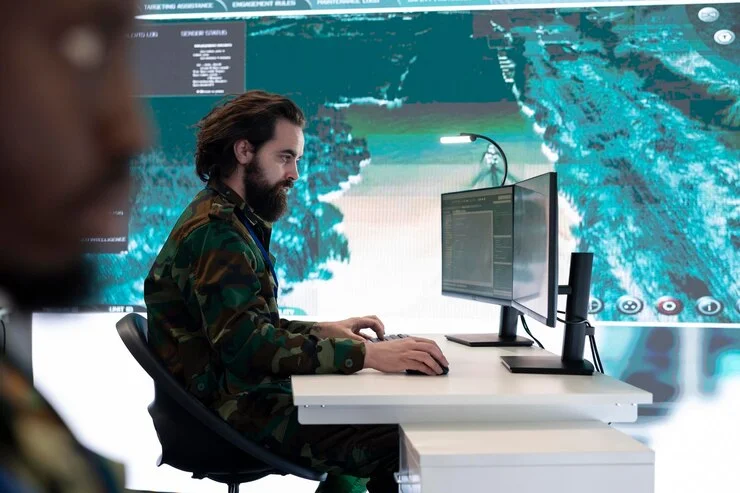The U.S. Air Force is deeply committed to cyber security, ensuring the safety of digital systems and national security. Cyber security plays a vital role in modern warfare, protecting against cyber threats that can harm critical operations. Aspiring cyber professionals find the Air Force appealing due to its structured contracts and unique career benefits.
Air Force contracts offer flexibility and opportunities, allowing individuals to develop skills while serving their country. These contracts are designed to attract talent and provide valuable training for future careers in cyber security.
Understanding the Air Force Cyber Security
Air Force Cyber Security protects the nation’s digital systems from cyber threats. It ensures secure communication, data protection, and operational readiness during missions. This critical work keeps the country safe in an increasingly digital world.
Personnel in Cyber Operations Air Force and Cyber warfare Officer Air Force roles handle vital responsibilities. They monitor networks, detect cyber threats, and respond to attacks quickly. Their expertise helps defend the Air Force and national security.
The Air Force uses advanced technologies and systems to control the cyber domain. Tools include cutting-edge software, secure networks, and artificial intelligence for enhanced detection. These innovations keep operations strong and safe against modern threats.
Air Force Contract Options for Cyber Security
The Air Force offers various contract lengths, including a popular 6-year contract option. This contract provides comprehensive training and experience in cyber security. Many recruits choose it for its career-building benefits and steady progression opportunities.
Contract terms are flexible, catering to both active-duty and reserve roles. Air Force Reserve cyber warfare positions allow individuals to balance service with civilian life. These options help recruits tailor their commitments based on personal and professional goals.
Training durations depend on the specific cyber security role and Air Force requirements. After training, recruits fulfill service obligations by applying their skills. This ensures they are fully prepared to handle real-world cybersecurity challenges.
Career Paths in Air Force Cybersecurity
The Air Force offers exciting roles like Cyber warfare Officer Air Force and Cyber Intelligence Analyst Air Force. These professionals monitor, detect, and respond to cyber threats that target military systems. Their work is essential for protecting national security in the digital age.
Cyber security professionals in the Air Force enjoy competitive salaries and excellent benefits. The Cyber Warfare Operations Air Force salary includes housing allowances, health care, and retirement plans. These benefits make a cyber-security career in the Air Force rewarding and secure.
There are many growth opportunities in Air Force cyber security careers. Professionals can advance to leadership roles or specialize further in their field. Continuous training ensures they remain skilled and prepared for evolving cyber challenges.
Life as a Cyber Security Professional in the Air Force
The Air Force provides training programs and certifications to its cyber security professionals during service. These programs include hands-on learning, advanced technical skills, and real-world problem-solving. Certifications earned can benefit careers both in the military and civilian sectors.
Cyber Intelligence Analyst Air Force professional has important daily responsibilities. They analyze data, detect threats, and create strategies to secure networks. Their work ensures the safety of crucial military systems and information.

Balancing work and life as an Air Force cyber security professional can be challenging but rewarding. Air Force Reserve cyber warfare roles allow flexibility to manage both military and civilian commitments. Despite challenges, many find the experience highly fulfilling and impactful.
Why Choose a Cyber Security Career in the Air Force?
A cyber security career in the Air Force comes with valuable benefits, including education assistance and housing support. These benefits help professionals build a secure future while serving their country. The Air Force ensures its members and their families are well cared for.
Working in Cyber Operations Air Force provides real-world experience in defending against cyber threats. Professionals gain hands-on skills and work with advanced technologies. These experiences prepare them for both military and civilian cyber security roles.
Cyber security professionals in the Air Force contribute directly to national defense, protecting vital systems from cyber-attacks. This career also offers personal fulfillment by making a meaningful impact. Serving in this role combines purpose with professional growth.
Final Thoughts
Cyber security roles in the Air Force are essential for protecting national security and maintaining digital safety. These roles offer advanced training, real-world experience, and the chance to safeguard critical systems. They are crucial for addressing modern cyber threats.
Flexible contract options in the Air Force make it easier to achieve diverse career goals while serving the nation. Whether on active duty or reserve, individuals gain valuable skills and opportunities. Joining Air Force Cyber programs can lead to a fulfilling career with a meaningful purpose.
Frequently Asked Questions (FAQs)
Q1. How long is cyber security training in the Air Force?
Cyber security training in the Air Force usually lasts a few months. It depends on the program and skills being taught.
Q2. How long are Air Force contracts for?
Air Force contracts are usually 4 to 6 years long. It can change based on the job and role.
Q3. How long is the Air Force Cyber Warfare Operations contract?
The Cyber Warfare Operations contract in the Air Force is often part of a 6-year enlistment. Training and working time are included in this.
Q4. What is the best military branch for cyber security?
The Air Force is often seen as the best branch for cyber security jobs. They focus a lot on technology and computers.
Q5. Is cyber security in demand in the Air Force?
Yes, cybersecurity is in high demand in the Air Force. They need experts to protect their computer systems.
Q6. What is the hardest cyber security job?
The hardest cyber security jobs involve stopping hackers and protecting secret information. These jobs need a lot of skill and focus.







